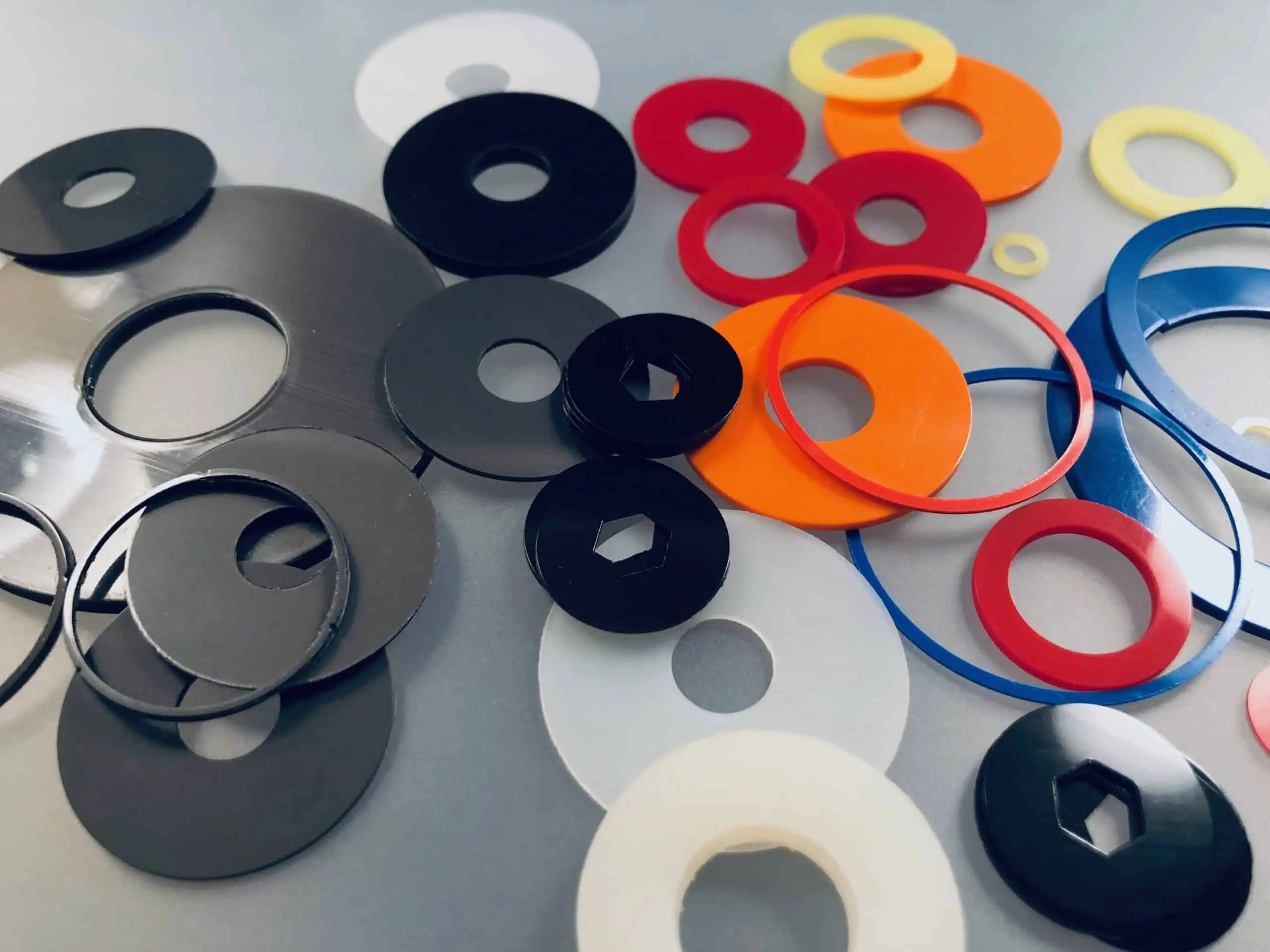When it comes to producing nonmetallic stamped components, manufacturers have several material options to choose from. Nylon is often a popular choice due to its versatility and various other beneficial properties. Because nylon is available in several product variations, it is well-suited for use in a wide range of industries and applications, including plumbing, automotive, household appliances, machinery components, and many more. Here, we’ll discuss the primary differences between Nylon 6, Nylon 6/6, and Nylon MDS to help you decide which option is best for your needs.
What is Nylon 6?
Nylon 6 features a slightly lower continuous service temperature rating than Nylon 6/6 but can withstand higher speeds and loads when used in bearing applications. This material has all of the primary properties of any nylon polymer, including toughness, stiffness, good insulation characteristics, and excellent mechanical dampening.
Nylon 6 is often found in fabrics but is also a suitable replacement for steel, aluminum, brass, and other metals. Its high strength combined with its other desirable properties make it a great choice for applications such as:
- Spacers
- Washers
- Gears
- Plumbing parts
- Bearings
- Insulators
- Forming dies
- And much more
What is Nylon 6/6?
Nylon 6/6 is similar to Nylon 6 but features a few key distinguishing features:
- Chemical resistance. Compared to Nylon 6, Nylon 6/6 is more resistant to acids, making it a better option for applications exposed to harsh chemicals.
- Higher service temperature range. Continuous service temperature range refers to the highest temperature a material can withstand before permanent degradation occurs with prolonged exposure. While Nylon 6 has a continuous service temperature range of 200°F, Nylon 6/6’s continuous service temperature range is 210°F.
These features make Nylon 6/6 suitable for applications such as steering parts, chemical components, electrical components, plumbing parts, and more.
What is Nylon MDS?
Nylon MDS is a variation of Nylon 6/6 made with fine MDS particles. The addition of MDS enhances the load-bearing capacity of the material without sacrificing its impact resistance. MDS-filled nylon also has self-lubrication qualities comparable to PTFE, resulting in exceptionally high service life and resistance to wear.
In addition to its cost-effectiveness, Nylon MDS features superior durability and toughness, making it a great material choice for components exposed to high mechanical stresses. As the strongest and hardest form of nylon, it is ideal for applications such as washers for machinery components, parts that are in constant motion, boating and marine parts, kitchen appliances, food-grade applications, bearings, gears, and more.
How to Select the Correct Type of Nylon for Your Application
When choosing between Nylon 6, Nylon 6/6, or Nylon MDS, you must consider your application’s specific requirements for processing, mechanical properties, and aesthetic appearance:
- Nylon 6. Nylon 6 is ideal for applications requiring a lightweight material with high stress and impact resistance. Due to its lustrous finish, it has a more attractive appearance than Nylon 6/6. However, this material is not ideal for applications exposed to high-temperature water, as it has a lower heat deflection and higher water absorption rate. For these instances, Nylon 6/6 would be the superior choice.
- Nylon 6/6. Nylon 6/6 is the best choice for applications requiring a high-performance engineering plastic capable of withstanding higher temperatures. It also offers good stiffness, tensile strength, and flexural modulus, making it suitable for repeated long-term use.
- Nylon MDS. Finely divided particles of MDS impart extra lubricity to this type of Nylon, allowing it to function with little to no lubrication. This makes it ideal for applications where external lubrication is contaminating, difficult to maintain, or impractical. The extra lubricity also enhances component lifespan, making Nylon MDS a cost-effective option.
High-Precision Nonmetal Stamping Services From NPF
Selecting the right nylon is key to ensuring the success of your nonmetal stamping project. At New Process Fibre, we are well-equipped to handle standard and custom nonmetal stamping projects of any size. Whether you choose Nylon 6, Nylon 6/6, or Nylon MDS, we can work with you to create high-quality stamped parts that fit the needs of your application. To learn more about our precision nonmetal stamping capabilities, or for help determining which nylon material is right for your needs, contact us today.


